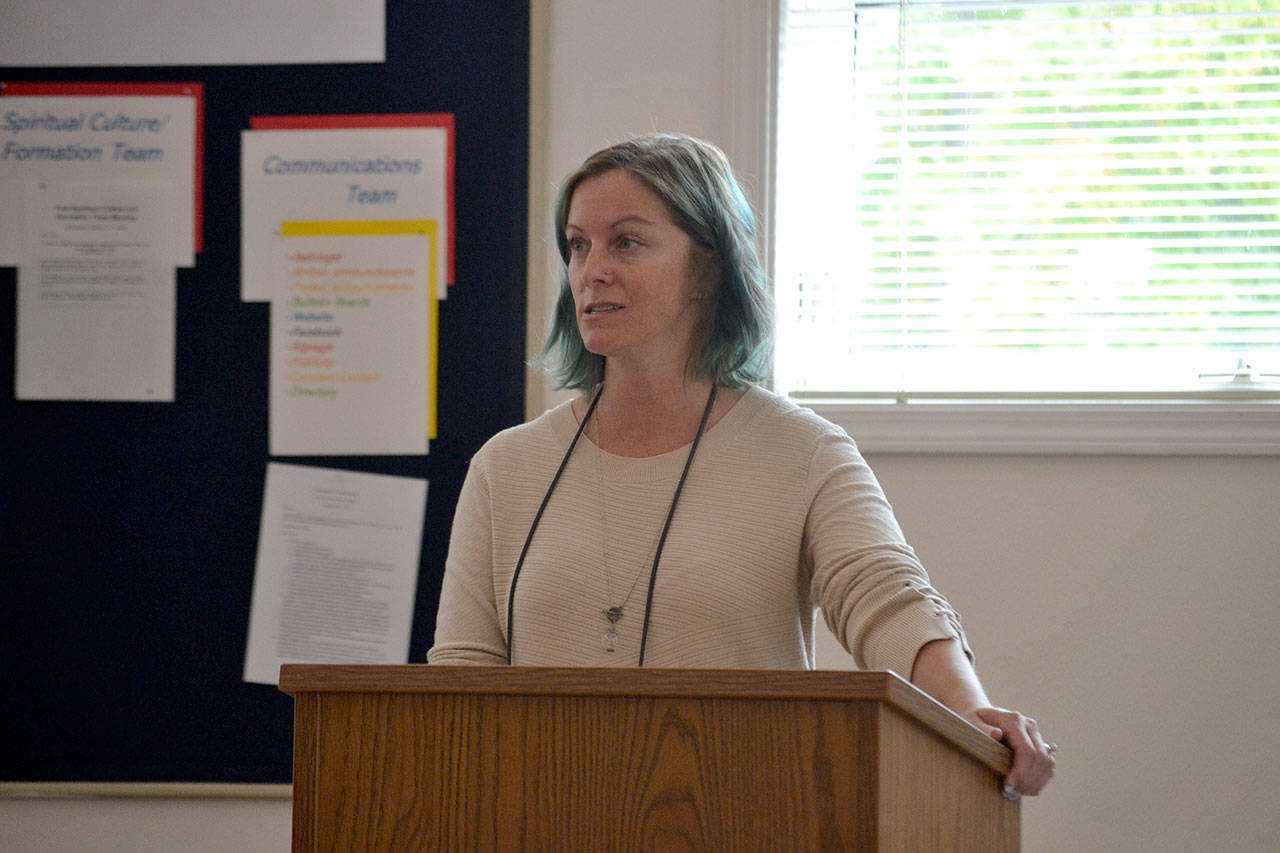SEQUIM — Sequim police officers and Olympic Peninsula Community Clinic staff plan to work together to connect Sequim’s homeless and at-risk individuals with resources they need through the REdisCOVERY program.
Started in June 2018 in Port Angeles, REdisCOVERY helps Amy Miller of Volunteers In Medicine of the Olympics and law enforcement and/or paramedics work with those living on the street to help them find various services such as medical assistance.
Last year, the program operated in Sequim with a part-time staffer through a grant from the Washington Association of Sheriffs & Police Chiefs.
Mary Hogan, executive director for Olympic Peninsula Community Clinic, said she’s waiting on the go-ahead from her board of directors to approve the part-time position through June 2020.
She said Sequim City Council will discuss approving the position tentatively Nov. 12.
A “navigator” has worked with the Port Townsend Police Department since April, having been shifted to fulltime in June.
Judson Haynes, a contract counselor with MCS Counseling Group of Silverdale, helps people connect with the services they need to better their positions, such as finding food, clothes and counseling.
His position is funded through 2020 by a grant from the Jefferson County Department of Health and the city of Port Townsend.
Miller, who rides along with Sequim and Port Angeles police officers and Clallam County Sheriff deputies, spoke to the Sequim Cares group Sept. 19 in St. Luke’s Episcopal Church about her role.
“A lot of what I do is identifying and filling gaps,” she said.
“Some of those things are tangible like helping them to get an ID so they can apply for a job,” Miller said. “Sometimes it means requesting an out-of-state birth certificate. Sometimes it’s a ride to an appointment, or a text message to remind them.”
When drug treatment is involved, she said she mostly assists people by getting them into a detox program and/or connecting them with an agency to assist with long-term treatment.
For medical treatment, Miller said, she will “send them to the places that make the most sense.”
Since the program started, Miller said she’s engaged 271 distinct individuals and about 75 percent of them were chronically homeless from the grant year July 1, 2018, to May 15, 2019.
Sequim’s support
As for Sequim’s homeless population, she said the sample size so far is too small.
“When dealing with folks who have been out there a long time, their issues are long-term issues,” Miller said.
“When looking at more substance use and mental health issues, it’s a lot harder to re-house folks.
“Even in the 75 percent of the chronically homeless, there are quite a few who aren’t using drugs and working on their sobriety, or have been sober for many years. It’s really hard to lump.”
Miller said she and law enforcement have taken many trips to detox and a “fair number of admissions to medication-assisted treatment” in Port Angeles.
Staff Sgt. Sean Madison with Sequim Police Department said the clinic’s part-time staffers made a checklist where people were and they’d follow-up with them about resources.
“There is sometimes a belief that there’s a bunch of people in need lining up for services,” Madison said. “Truth is, it can be a really confusing and intimidating system. The longer I’m involved, the less I realize I know about it.”
Madison said holding identification is key for everything but if you’ve lived in a tent for six months, accessibility and funds are likely restrictive.
“Amy is able to go out and look for people; who else is doing that?” he asked.
Madison said that prior to REdisCOVERY, there wasn’t a mechanism to help connect people to those services.
Miller said Sequim officers have put together an envelope with resource contacts to help guide them.
“There are things that they can do,” she said. “They’re throwing everything they’ve got at this.”
Miller said her position is solely funded on the nine-month cycle through the grant. She’s put in requests for rotary grants, too.
Aside from permanent funding, Miller told the Sequim Cares group that a separate fund of about $5,000 a year could help with a range of items such as birth certificates and transportation items.
Donations through local church congregations and individuals support the Sequim Police Department’s fund for emergency situations.
Madison the policy is strict on how they can use the fund, but “if Amy calls me and said we need a birth certificate from Ohio, we’re going to figure it out.”
Miller said in her discussions, she’s met an array of people and if she can plan for their needs, like a birth certificate, then she can secure funding. But sometimes it’s simpler than that.
“I’ve met more than a handful who have been living outside for a week or so and they don’t know how to get back home,” she said. “They don’t have a phone to call their family members. That’s been a simple solution. Here’s a my phone.
“Sometimes the solutions are easy. Sometimes they’re not. But sometimes they’re unbelievable … a phone call or a bus pass back home.”
Miller said the biggest way the public can make a difference is “just by being kind, being able to see each individual as an individual and not make prejudgments.”
In the future, her goal is to establish a volunteer group, too. Those looking to support the REdisCOVERY program financially or as a volunteer can call 360-457-4431 or visit www.vimoclinic.org.
________
Matthew Nash is a reporter with the Olympic Peninsula News Group, which is composed of Sound Publishing newspapers Peninsula Daily News, Sequim Gazette and Forks Forum. Reach him at mnash@sequimgazette.com.

